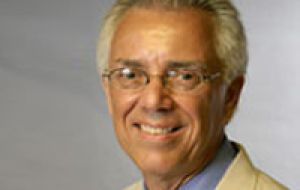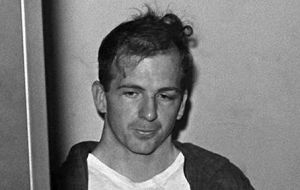MercoPress. South Atlantic News Agency
Fidel Castro an unchallenged master-spy, admits veteran CIA analyst in a book
 Brian Latell, author of “Castro's Secrets, the CIA and Cuba's Intelligence Machine”
Brian Latell, author of “Castro's Secrets, the CIA and Cuba's Intelligence Machine”  Fidel Castro was aware of the plot to assassinate John Kennedy argues Latell
Fidel Castro was aware of the plot to assassinate John Kennedy argues Latell  Lee Harvey Oswald, an admirer of Fidel Castro, ”but it was his (Oswald's) plan and his rifle, not theirs”
Lee Harvey Oswald, an admirer of Fidel Castro, ”but it was his (Oswald's) plan and his rifle, not theirs” Almost three decades after Fidel Castro took power, Cuba's budding intelligence service fielded four dozen double agents in a world-class operation under the nose of the CIA, according to a new book by a veteran CIA analyst.
It was not until June 1987, when a Cuban spy defected to the US Embassy in Vienna, blind-siding US intelligence services, that the CIA learned how badly it had been duped, writes Brian Latell, a retired veteran CIA analyst and Cuba specialist.
“Castro was a supreme, unchallenged spy master” Latell told an audience at a recent book reading.
The revelations in Latell's book help explain how Castro survived several well-documented assassination attempts and the impoverished island of Cuba weathered the changes that toppled other communist regimes in the late 20th Century.
“In the annals of modern spy-craft it's a pretty extraordinary accomplishment. It's difficult to keep one double agent in play, and he managed them all ... down to the minute details,” added Latell, author of “Castro's Secrets, the CIA and Cuba's Intelligence Machine,” published by Palgrave Macmillan.
Latell began watching Cuba in the mid-1960s and served as US National Intelligence Officer for Latin America before retiring from the CIA in 1998.
All four dozen double agents were recruited in Cuba and other parts of the world and personally run by Castro. He favoured young, rough-hewn, impressionable teens without a university education.
“Castro wanted them to be uncontaminated by the old Cuba. He wanted them to be malleable and enthusiastic,” Latell says.
While Cuba has trumpeted its success with double agents in the past, Latell's book shows the penetration was more extensive than previously known and compromised US intelligence sources and methods.
The defection in 1987 of Florentino Aspillaga finally alerted the CIA to the extent of Castro's spy network. “They were in a state of shock. Nothing like this had ever happened to us before,” said Latell.
Aspillaga was “the most informed and highly decorated officer ever to defect from Cuban intelligence,” Latell says, and his defection was a turning point in the CIA's attitude toward Cuba.
“Until that point we grossly underestimated the Cubans. We never imagined that little Cuba could run an intelligence service that was world class,” he says.
Counter-intelligence operations were subsequently stepped up. After only four Cubans spies were arrested between 1959 and 1995, that number rose more than ten-fold between 1998 and 2011, Latell writes in his book.
Aspillaga was recruited as a spy at age 16 and spent 25 years in Cuban intelligence. His defection provided “some of the most precious secrets including the double agents,” says Latell, who interviewed him over several days in 2007.
The interview was conducted at the request of Aspillaga, who said he simply wanted to tell his story. Aspillaga also shared an unpublished memoir with Latell, asking for no payment or favour in return. The former agent now lives with a new identity after surviving an assassination attempt in London in 1988.
Aspillaga is just one of a dozen defectors Latell interviewed in the book, which relies on thousands of pages of declassified CIA documents the author reviewed at the National Archives in Maryland, as well as interviews with several CIA officers.
In the book, Latell reveals that Cuban intelligence knew more about the 1963 assassination of President John F. Kennedy than they admitted at the time, including information about the shooter, Lee Harvey Oswald.
Aspillaga told the CIA that in his first year he was trained to do radio intercept work, listening for CIA transmissions to spies on the island and incursions by sea.
On November 22, 1963, the day of the assassination, he was ordered to stop all CIA tracking efforts and redirect his antennas away from Miami and direct them toward Texas. Castro knew Kennedy was to be fired upon, Latell says Aspillaga told him.
The Warren Commission never attributed a motive to Oswald but Latell argues Oswald was fascinated with Castro and “his motive was to protect Fidel.”
It is well known Oswald met Cuban officials during visits to Cuba's Mexican consulate in the summer of 1963, but there is no evidence he ever worked directly for Cuban intelligence.
Latell says that while Cuban agents had kept track of Oswald, his research found no evidence linking Castro to the assassination. Instead, Latell has his own more nuanced theory.
Castro and his intelligence officers “were complicit in Kennedy's death,” Latell writes, “but ... their involvement fell short of an organized assassination plot.”
Cuban intelligence officers “exhorted Oswald” and “encouraged his feral militancy,” he writes, ”but it was his (Oswald's) plan and his rifle, not theirs.“
Castro had plenty of reason to want Kennedy out of the way. A Senate Committee found in 1975 that the CIA had pursued assassination as an instrument of foreign policy, with Fidel Castro as one of its prime targets.
The Committee's first documented plots against Castro began in 1960, when the CIA contacted organized crime figures eager to return to the good old days of gambling, extortion and corruption in Cuba. Subsequent plots involved poison, an exploding seashell and marksmen with high-powered rifles.
Even though the CIA's monitoring of Cuban intelligence improved substantially in the last 25 years, the Cubans remained very capable, Latell says.
He cites the case of Ana Belen Montes, a Cuban mole at the Defence Intelligence Agency, who was arrested in 2001 only days before she would have gained access to US plans to attack al Qaeda and Taliban targets in Afghanistan.
Fidel Castro is, however, no longer in charge. Now 85, he handed over power to his brother after falling ill in 2006 and is likely ”too debilitated” to run spy operations, Latell says.




Top Comments
Disclaimer & comment rules-

-

-

Read all commentsCastro smart but that doesn't make him anymore than a Communist dictator who crushes democracy and freedom in Cuba, while enriching his own family. Grand geo-political military adventures in Africa and sending his henchmen like the murderous Che Guevara to Bolivia are part of his grand plan that didn't do so well. However, its only now under Raul that Cubans can even own a home or sell a car.
May 29th, 2012 - 10:39 pm 0As for Cuba's latest crop of spys, like the recently-arrested Russian 10, maybe the quality is going downhill somewhat? However, the usual leftist suspects (academics, radicals, Nobel prize winners) are supporting the “Cuban Five” convicted spies - similar to those haranguing Falkland Islanders to knuckle-under to Argentina's malvinista campaign.
How do they think we got Dan Mitrione? :)
May 30th, 2012 - 03:24 am 0no comment !
May 30th, 2012 - 07:48 am 0Commenting for this story is now closed.
If you have a Facebook account, become a fan and comment on our Facebook Page!